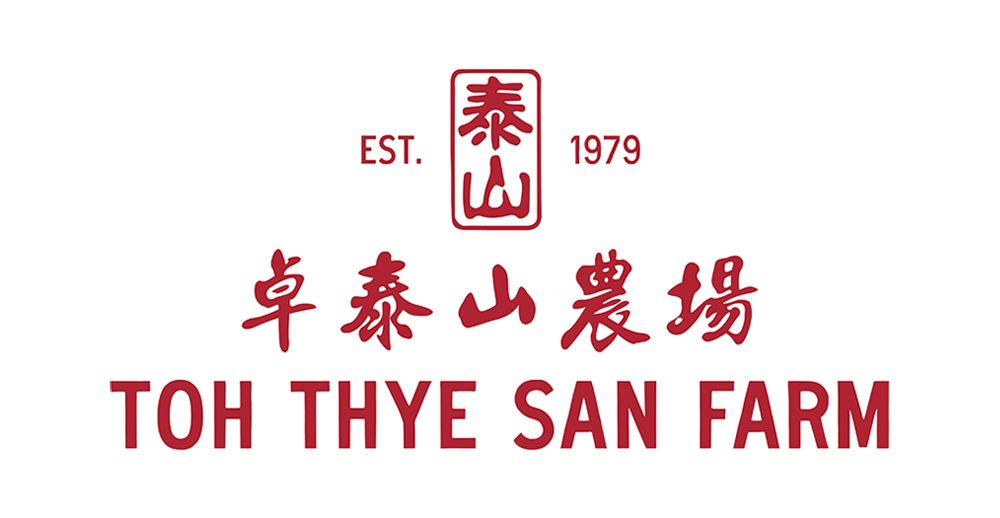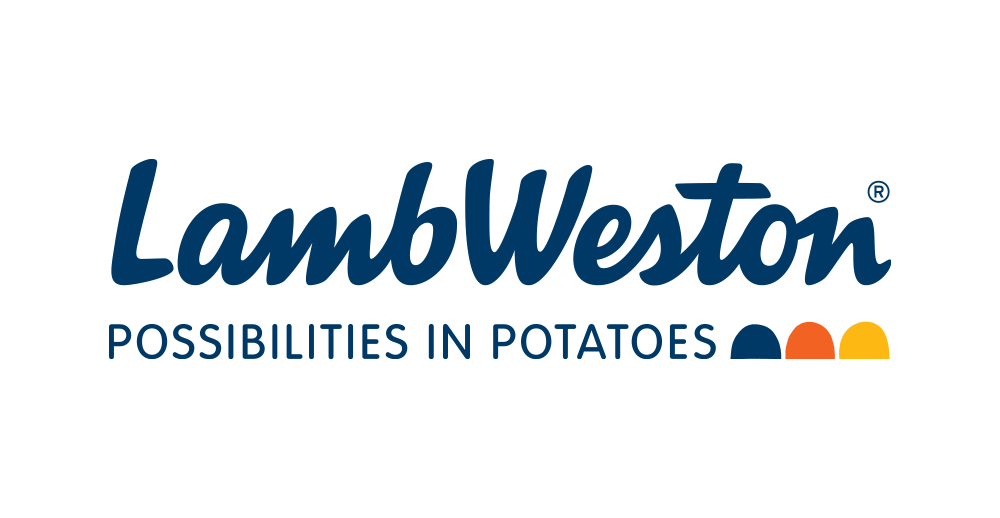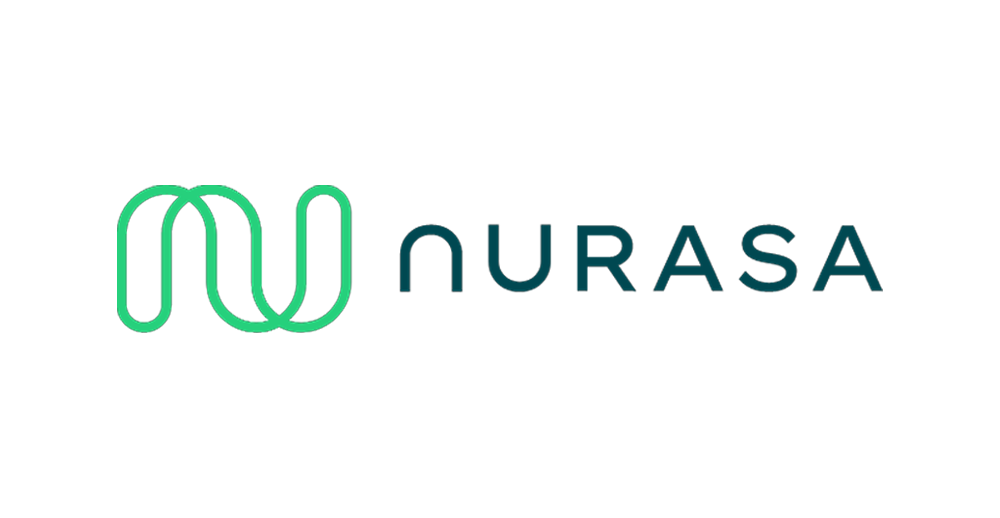Nutraceuticals are changing the way we think about health and wellness. Combining the nutritional value of food with the therapeutic benefits of pharmaceuticals, these products are designed to nourish the body while addressing specific health concerns.
From dietary supplements to fortified foods, nutraceuticals are an innovative approach to proactive health management.
So, what are nutraceuticals? They’re bioactive compounds derived from natural sources scientifically formulated to enhance well-being.
Nutraceuticals are crucial in modern preventive care, whether they boost immunity, improve digestion, or support cognitive health.
What Are Nutraceuticals?
Nutraceuticals are products derived from food sources that provide additional health benefits than essential nutrition.
They include supplements, fortified foods, and functional beverages designed to nourish the body, promote well-being, and prevent diseases. Some common examples include omega-3 supplements, probiotics, and antioxidant-rich foods.
The term “nutraceutical” combines “nutrition” and “pharmaceutical,” highlighting their dual role in enhancing health. Introduced in 1989 by Dr. Stephen DeFelice, the concept highlights the growing connection between food science and medical research.
Nutraceuticals are essential in reducing the risk of chronic diseases like heart disease, diabetes, and arthritis.
More than 58% of US adults take at least one vitamin supplement daily, reflecting the increasing adoption of nutrition supplements for preventive health and wellness.
As advancements in food science continue, nutraceuticals evolve, bringing new opportunities for improving overall health through natural and bioactive compounds.
Types of Nutraceuticals
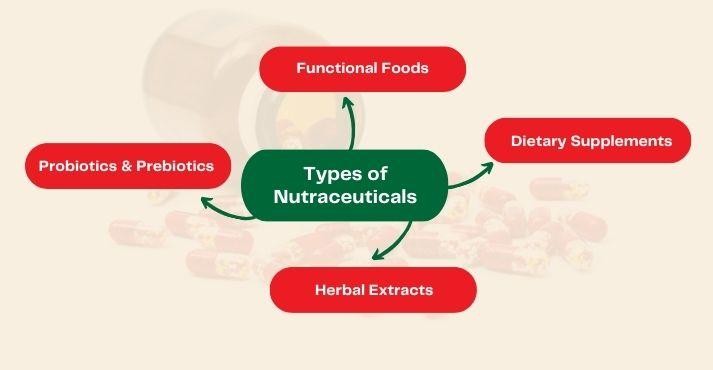
Nutraceuticals come in various forms, each offering unique benefits. Here’s a look at the main types of nutraceuticals that contribute to health and wellness:
1. Functional Foods
Functional foods are everyday foods enhanced with additional nutrients or bioactive compounds to provide health benefits. Examples include fortified cereals, which may be enriched with vitamins and minerals, or probiotic yogurts that support gut health. These foods offer an easy way to incorporate added health benefits into a daily diet.
The growing functional foods market shows the increasing consumer interest in products that offer not only basic nutrition but also contribute to overall wellness.
2. Dietary Supplements
Dietary supplements are non-food products created to provide concentrated nutrients that may be lacking in the diet. These include vitamins, minerals, omega-3 fatty acids, and herbal supplements.
The types of nutrients available in supplements are highly varied, with some targeting specific deficiencies or health concerns.
For example, vitamin D supplements are important for bone health and turmeric capsules for inflammation relief. These nutraceutical tablets help individuals meet their nutritional needs and can target specific health concerns.
3. Herbal Extracts
Herbal extracts are derived from plants and contain bioactive compounds known for their medicinal properties. These extracts, such as ginseng, echinacea, or ginger, boost immunity, improve energy levels, and reduce inflammation. They are often available in liquid, capsule, or tablet form, offering a natural alternative for supporting health.
4. Probiotics and Prebiotics
Gut health has gained significant attention recently, with probiotics and prebiotics taking the spotlight. Probiotics are beneficial bacteria found in foods like yogurt and supplements. They are known to support digestion and immunity.
Prebiotics, on the other hand, are non-digestible fibers that nourish these good bacteria. Together, they help maintain a balanced gut microbiome, which is crucial for overall health.
This classification of nutraceuticals shows how they help individuals take charge of their health and well-being.
Health Benefits of Nutraceuticals
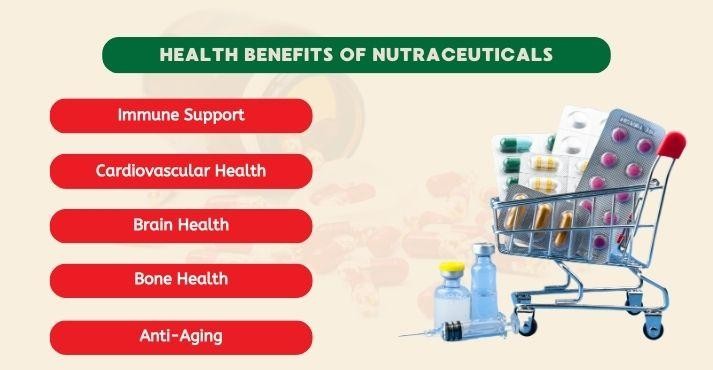
Nutraceuticals offer a wide range of health benefits, each targeting specific aspects of wellness. Here’s a closer look at how these nutritional products help in improving health:
1. Immune Support
Nutraceuticals like vitamin C, zinc, and elderberry are known for their immune-boosting properties. These supplements help strengthen the body’s natural defenses, reducing the severity and duration of common illnesses. Studies suggest that vitamin C supports immune health and helps protect the body from oxidative stress.
2. Cardiovascular Health
Nutraceuticals such as omega-3 fatty acids and antioxidants often support heart health. Omega-3s in fatty fish and supplements can help reduce inflammation, lower blood pressure, and prevent heart disease.
Antioxidants like vitamin E and coenzyme Q10 are also known for protecting the heart from oxidative damage and promoting healthy blood vessels.
Research suggests that CoQ10 can improve symptoms of heart conditions such as congestive heart failure and may support the recovery of patients undergoing heart surgeries.
3. Brain Health
Nutraceuticals like ginkgo biloba and blueberries can benefit cognitive function.
Ginkgo biloba is often used to enhance memory and circulation, while blueberries are rich in antioxidants that protect brain cells from damage, potentially improving long-term cognitive function.
Studies suggest that both Ginkgo biloba and antioxidants like those found in blueberries may play a role in preserving cognitive function and protecting against age-related decline.
4. Bone Health
Vitamin D and calcium are essential nutraceuticals for maintaining strong bones. Vitamin D helps the body absorb calcium, which is critical for bone density and strength.
Together, they reduce the risk of osteoporosis and fractures, especially in older adults. Adequate intake of both nutrients helps reduce the risk of fractures, particularly in older adults, by improving bone mineralization and preventing bone loss.
5. Anti-Aging
Antioxidants and collagen supplements can slow down the aging process. Antioxidants like vitamin C not only helps fight oxidative stress but also stimulates collagen production, improving skin elasticity and reducing the appearance of wrinkles.
Collagen itself is crucial for maintaining youthful skin, as it supports skin structure and hydration, contributing to a firmer, more radiant complexion.
These two nutrients are often incorporated into anti-aging supplements aimed at enhancing skin health and preventing damage from environmental factors like pollution and UV rays.
Nutraceuticals are essential in improving quality of life and supporting long-term health. Their ability to prevent diseases, enhance mental clarity, and slow the effects of aging makes them valuable additions to a balanced wellness routine.
Global Market for Nutraceuticals
The nutraceutical market has seen rapid growth in recent years, driven by increased consumer health and wellness awareness. Nutraceuticals, from functional foods to dietary supplements, are becoming a significant part of daily health regimens.
Here’s a look at the global market trends and regulatory landscape:
Market Size and Growth
The global nutraceuticals market is expected to reach over $650 billion by 2030, with North America and Europe leading in market share. However, the Asia-Pacific region is seeing rapid growth, inspired by an increasing demand for natural and plant-based products.
The market is growing as consumers become more proactive about their health, seeking products that support immunity, energy, and overall well-being.
Nutraceutical products are regulated differently around the world. In the US, dietary supplements are classified as food and regulated by the FDA but not subject to the same strict standards as pharmaceuticals.
Meanwhile, functional foods may fall under food safety regulations, but they aren’t considered medicines. Pharmaceuticals, on the other hand, undergo extensive clinical trials and regulatory approval processes before reaching the market.
These regulatory differences create a unique system for each product type and influence how they are marketed to consumers.
Trends in Southeast Asia
Southeast Asia is a rapidly growing nutraceutical market, driven by increasing consumer preference for natural and plant-based products.
Countries like Singapore, Malaysia, and Indonesia are seeing a shift toward functional foods and dietary supplements, particularly those made from local herbs and plants.
Moreover, in Singapore, the SFA Food Regulation ensures that these products adhere to strict safety and quality standards, ensuring that consumers receive reliable and beneficial nutraceuticals.
Consumers are especially drawn to traditional ingredients such as turmeric, ginseng, and moringa, reflecting a wider trend towards natural and sustainable products.
The nutraceutical industry growth in Southeast Asia is supported by rising incomes and increasing health awareness. As a result, manufacturers are innovating to create clean-label, plant-based products, aligning with a growing demand for wellness-focused and eco-friendly options.
Nutraceuticals vs. Pharmaceuticals: What’s the Difference?
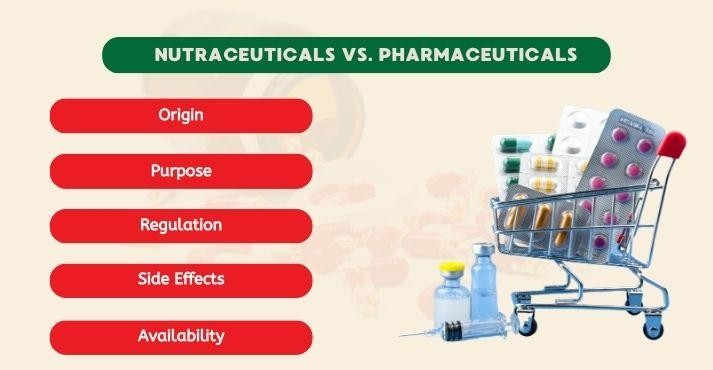
While nutraceuticals and pharmaceuticals serve health-related purposes, they vary significantly in their origin, purpose, and regulation. Let’s check out the quick pharmaceutical vs. nutraceutical comparison below to see how they differ from each other:
- Origin: Nutraceuticals are derived from natural food sources such as plants and herbs, while pharmaceuticals are generally synthesized in laboratories using chemical processes.
- Purpose: Nutraceuticals are intended for health maintenance, disease prevention, and improving overall wellness. Pharmaceuticals, on the other hand, are primarily designed to treat specific medical conditions or diseases.
- Regulation: Nutraceuticals are usually regulated as food products under less stringent guidelines than pharmaceuticals, which undergo rigorous clinical trials and regulatory approval processes from agencies like the FDA.
- Side Effects: Nutraceuticals generally have milder side effects, focusing on supporting the body’s functions with fewer risks, while pharmaceuticals can sometimes cause severe or long-term side effects due to their potency.
- Availability: Nutraceuticals are often sold over-the-counter in health stores or online, making them more accessible. Pharmaceuticals, however, typically require a prescription and are dispensed by licensed healthcare providers.
These differences highlight how nutraceuticals focus on preventive health while pharmaceuticals are inclined toward treatment.
Conclusion
Nutraceuticals offer an exciting way to enhance health and prevent disease through nutrition and natural ingredients. As consumer demand for preventive and holistic wellness solutions grows, these products are becoming increasingly popular in daily health routines.
Nutraceuticals have proven effective in addressing a wide range of health concerns, whether boosting immunity or supporting heart health. These products are not just supplements but valuable solutions for maintaining long-term well-being.





















